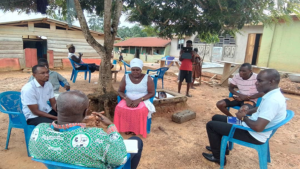Promoting Healthcare through Faith-based Organizations
Twifo-Hemang-Lower-Denkyira District, Ghana - Community engagement and participation play a significant role in the health system delivery. Community actors are uniquely positioned to drive demand for health services and champion community ownership of public health interventions, especially at the primary level of health care.
In the Twifo-Hemang-Lower-Denkyira-District (THLDD), activities of Maame Sofo Sarah Pamful, and her faith-based organization, New Jerusalem Prayer Garden have contributed immensely to healthcare delivery and the early detection of health conditions or diseases of interest.
“As a leader in society, I must ensure that my followers make the right decisions that will impact positively on their health. That is why I have been helping them to understand that the solution to health problems is at the hospitals,” Maame Sofo, the Overseer of the New Jerusalem Prayer Garden.
Since 2004, she has been a strong advocate of Primary Health Care services. This prayer camp, located along the Twifo-Hemang-Nsuntem Road is an excellent example of how faith-based actors can contribute to surveillance and health care in general. As an advocate, Maame Sofo has been involved in several referral of pregnant women to the health center for Antenatal Care (ANC) and delivery services.
Furthermore, she has helped to change the health seeking behaviour of expectant mothers to patronize ANC services at the health centre instead of Traditional Birth Attendants (TBA). This has been achieved this through education and prompt referrals. Unlike other prayer camps, she only accepts to see expectant mothers who have initially visited the Antenatal Clinic and sees to it that the client completes all her ANC visits.
“Sofo Maame Sarah Pamful’s activities at the new Jerusalem prayer camp has contributed immensely to improve our ANC coverage over the years. Many pregnant women and OPD cases have been referred to Hemang Health Center and Nsuntem Community Health Planning and Service (CHPS) due to her collaboration with us,” says Mary Boadi, the Physician Assistant of Hemang Health Center.
Similarly, and to address low Child Welfare Clinic (CWC) attendance by caretakers/mothers, the Overseer provided a shed within the prayer camp for Community Health Nurses to render CWC services. The location of the CWC has promoted visits by Caregivers to CWC, which has improved immunization services for under five children. Her ability to mobilise the community including caregivers has been crucial to both routine and campaign immunization sessions.
Over the years, the New Jerusalem Prayer Garden has notified Nsuntem CHPS and Hemang Health Center of some diseases and health events for prompt action. In the past 5 years, 31 priority conditions have been reported by the prayer camp to the Health Center or District Health Administration for treatment or further investigations.
The District Health Administration has recognized the Overseer of New Jerusalem Prayer Garden as very cooperative and very exemplary. “Activities of Sofo Maame have contributed to an increase in Tuberculosis case detection and reduction in defaulter rate/cases. The camp itself serves as a DOT Center for treatment and management of TB cases” says Edmund Bowah the District Disease Control Officer.
It is worth noting, the health belief model of some community members makes these prayer camps an important collaborator in health service delivery.
“I came to the prayer camp with a 3-year-old baby with difficulty in walking, weight loss and wasted muscles. In addition to prayers, I was referred to Hemang Health Center to see a Nutritionist for nutritional care and now my baby can walk on both legs”, says Cecilia Ofori, a caregiver.
“The activities of this prayer camp align with WHO’s efforts to promote health for all. We will continue to work with every stakeholder to promote the health and wellbeing of the people,” noted Prof Francis Kasolo, WHO Representative to Ghana.
In many communities, visits to prayer camps form an integral part of health-seeking behaviour and there is the need to engage faith-based leaders to ensure that prayer camps and other religious establishments play their role in the promotion, protection and provision of appropriate health care to all.



